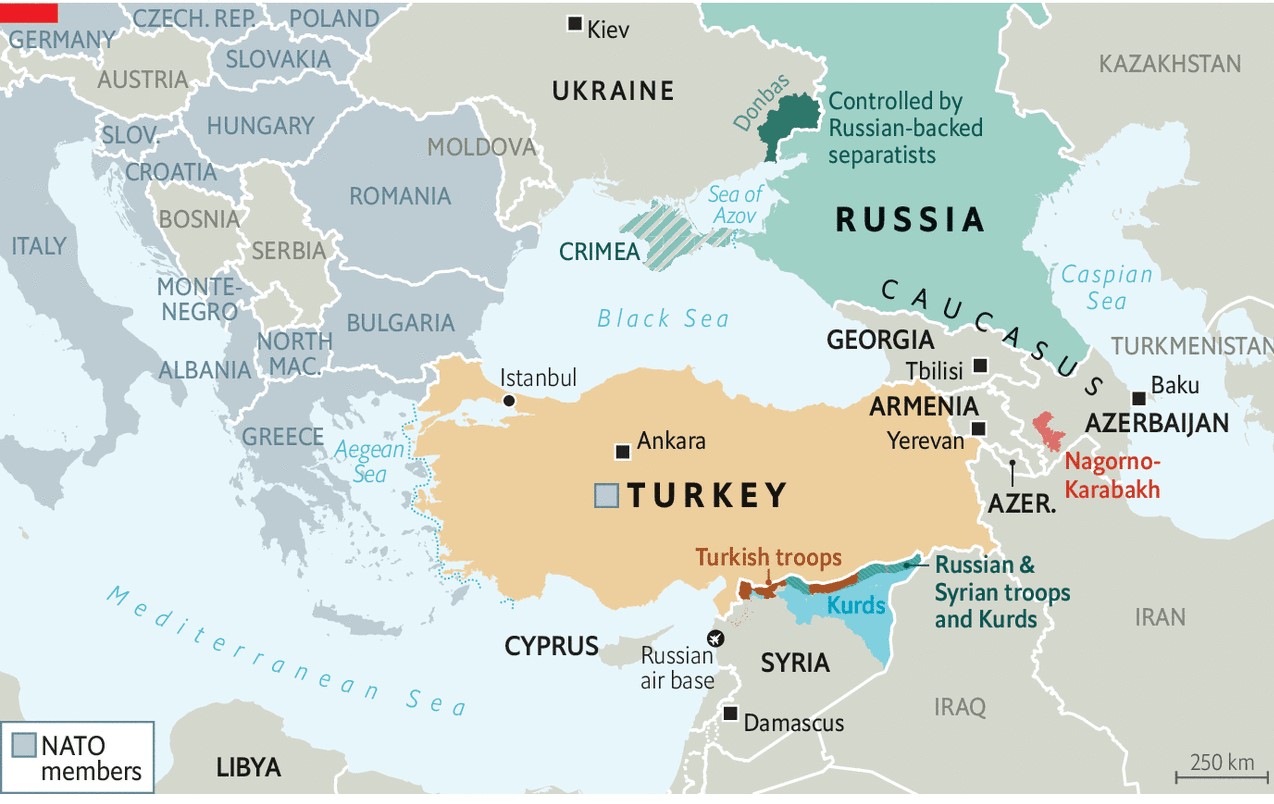India has to tread carefully with Turkey, given its present dominant influence, and Erdogan's inclinations.
Erdogan's 'Turkism' and Indian foreign policy
- The story: When a country makes a pitch for "internationalism" based on either religion, or region or secular ideologies, it tends to get opposed bitterly by sectarianism or nationalism. In all cases, it is nationalism at stake in different formats.
- Present day example: Today's relevant example is that of Turkey, where the President Recep Tayyip Erdoğan seeks to reshape his modern nation with the imprint of its earlier Islamic and military glory. Today's Turkey had a great run over eight centuries, in the form of the Ottoman empire, which disintegrated in the period leading upto the first World War (1914-1918). Then came Mustafa Kemal Pasha who totally obliterated the empire, and set up the modern, secular Republic of Turkey, in 1924. Erdogan's rise in the 2000s is in an opposite direction.
- As things change: With Turkish presence gradually becoming dominant in the Arab world and in India’s neighbourhood as an ally to China, Pakistan and Afghanistan, India can no longer afford to be at loggerheads with it. Can India instead look at Erdogan as an ally?
- Expansion of influence:
- Origin of Pan-Turkism - The first seeds of the ideology of "pan-Turkism" date back to the mid-19th century when campaigns for uniting Turkic people in Russia gained traction. Its geographic scope became much wider soon, covering the huge spread of Turkic people from the “Balkans to the Great Wall of China”. In the 20th century, the decline of Turkey began with the integration of Turkic people into other states.
- Turkey's influence - Nearly 5,000 Turkish companies work in Central Asia. Turkish annual trade with the region is around $10 billion. It has also made impressive progress in building transportation corridors to Central Asia and beyond, to China, Georgia and Azerbaijan. Turkey has stunned much of the world with its military power projection into the region; in the Armenia-Azerbaijan conflict, Turkish military intervention decisively tilted the war in favour of the latter, something no one had anticipated. For the Central Asian states, living under the shadow of Chinese economic power and Russian military power, Turkey offers a chance for economic diversification and greater strategic autonomy. Turkey’s good relations with both Afghanistan and Pakistan have also given space for Ankara to present itself as a mediator between the warring South Asian neighbours.
- Turkey’s “Heart of Asia” conference or the Istanbul Process has been a major diplomatic vehicle for attempted Afghan reconciliation in the last few years.
- The Ambitious Turkey: Turkey is a NATO member, but has gone ahead and established a strategic liaison with Russia. Despite Turkey’s criticism of China’s repression of Turkic Uighurs in Xinjiang, the former shares deep economic collaboration with Beijing. Moreover, Ankara’s ambitious pursuit of the Islamic world’s leadership has not led it to break diplomatic ties with Israel. Causes of Expanding Turkish Influence: Over the last three decades, a number of soft power initiatives in education, culture, and religion have raised Turkey’s profile in Central Asia and generated new bonds with the region’s elites. Turkey has steadily built its hard power in multiple domains.
- What India sees: The rise of pan-Turkism has important consequences for Afghanistan, the Caucasus, Central Asia and, more broadly on India’s Eurasian neighbourhood. Pan-Turkism adds another layer of complexity to Eurasian geopolitics.
- India’s opposition to alliances and Turkey’s alignments reflected divergent international orientations of Delhi and Ankara after the Second World War.
- The shared secular values between Delhi and Ankara in the pre-Erdogan era were not enough to overcome the strategic differences between the two in the Cold War. The current differences between Delhi and Ankara over Kashmir, Pakistan and Afghanistan are real and serious.
- Turkey’s growing role in Afghanistan opens a more difficult phase in relations between Delhi and Ankara.
- Turkey’s deepening bilateral military-security cooperation with Pakistan made it even harder for Delhi to take a positive view of Ankara. Turkey has become the most active international supporter of Pakistan on the Kashmir question, creating more difficulties for India.
- Summary: The current political divergence only reinforces the case for a sustained dialogue between the two governments and the strategic communities of the two countries. Turkey’s own geopolitics offers lessons on how to deal with Ankara; that it's a friend of Pakistan does not mean it won't do business with the much larger economy India. India, along with maintaining good ties with Saudi Arabia (who considers itself the leader of the Arab world), can also adopt Turkey’s approach of maintaining diplomatic ties with both sides. Today, many Arab leaders reject the policies of the Turkish President that remind them of Ottoman imperialism! It seems Erdogan wants to establish the pan-world Islamic Caliphate again. They hate Erdogan's support of groups that seek to overthrow moderate governments in the Middle East. This opens a range of new opportunities for Indian foreign and security policy in Eurasia. Free India has struggled to develop good relations with Turkey over the decades. Now, with Turkey set to play a major role in Afghanistan, India can no longer ignore Erdogan.
- EXAM QUESTIONS: (1) Explain why did Mustafa Kemal Pasha establish a secular Turkey, by eliminating the last vestiges of the Ottoman empire. (2) What are the goals of President Erdogan? Does he see himself as the potential Caliph for Muslims worldwide? (3) In what way will a resurgent Turkey, with present inclinations, be a challenge for Indian foreign policymakers? Explain.
* Content sourced from free internet sources (publications, PIB site, international sites, etc.). Take your own subscriptions. Copyrights acknowledged.


















